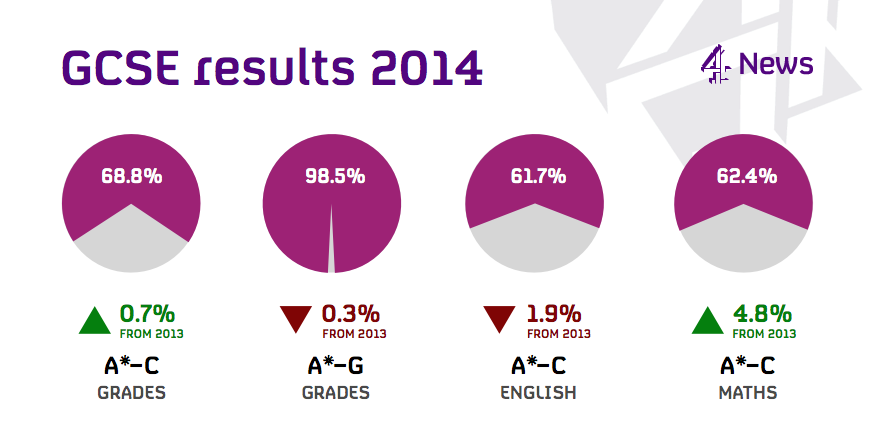GCSE results: A* to C grades rise, but English scores fall
The latest exam results show a rise in the number of A* to C grades overall, but grades in English have fallen slightly, as exam chiefs say GCSE reforms have played a part in the changing trends.

Just over two thirds (68.8 per cent) of GCSE entries scored A* to C, up 0.7 percentage points on last summer, according to the latest results published by the Joint Council for Qualifications (JCQ).
However the overall A* to G grade pass rate has fallen for the second year running, down 0.3 percentage points to 98.5 per cent from 2013.
Hundreds of thousands of teenagers across England, Wales and Northern Ireland are receiving their results on Thursday, and there were warnings about changes to the usual trends due to reforms brought in by former Education Secretary Michael Gove.
Read more from Andy Davies: GCSE results: the smiles, the hugs - and the relief
AQA chief executive Andrew Hall said that the biggest impact on exam results this year had been from schools not letting students sit exams early, because of the new rule that the first result is the only one which counts: before, they could sit exams multiple times from the age of 15.
The proportion of entries awarded the highest grade has also fallen slightly, with 6.7 per cent gaining an A*, down from 6.8 per cent last year – the third year in a row that this has fallen.

Good news for maths, bad news for English
The rise in A* to C grades is the first increase in three years, but within the results, there were huge differences between English and maths, both of which are considered key subjects.
In total, 61.7 per cent of English entries scored a C or higher this year, down 1.9 percentage points from last summer. This is believed to be the biggest drop in the qualification’s history.
In the last year, speaking and listening assessments have been removed from the GCSE English exam.
But maths saw an opposite result, with 62.4 per cent of entries gaining an A* to C grade, up a massive 4.8 percentage points on 2013.
‘One chance’ exams
The fact that only a teenager’s first attempt at an exam would count in school league tables, may have meant that fewer lower-performing 15-year-olds took maths GCSE early, and bright students, who may have taken the qualification early in the past, are now sitting it in the summer, JCQ said.
In recent years there has been a growing trend towards schools entering pupils for exams early, or multiple times, but the new rule has changed this, and figures published earlier this year showed a drop of around 40 per cent in early entry across all subjects.
JCQ also said that the fall in English grades could be down to strong candidates taking advantage of a final opportunity to sit the exam last winter, and a switch by students to take an international GCSE (IGCSE) in the subject.
Statistics also showed that the gender gap has widened at grade C and above this year, with 73.1 per cent of girls’ entries scoring A* to C compared with 64.3 per cent of boys.